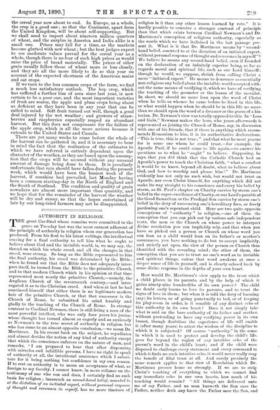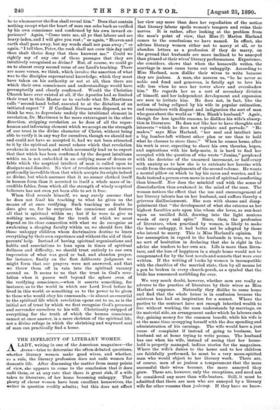AUTHORITY IN RELIGION. T HE great Cardinal whose remains were committed
to the grave on Tuesday last was the most earnest adherent of the principle of authority in religion whom our generation has produced. From his first to his latest writings, the intellectual craving for a final authority to tell him what he ought to believe about God and the invisible world, is, we may say, the thread on which his whole creed, and all the changes in that creed, were strung. So long as the Bible represented to him the final authority, his creed was determined by the Bible ; when he found out that the Bible does not adequately inter- pret itself, he turned from the Bible to the primitive Church, and to that modern Church which in his opinion at that time represented most nearly the primitive Church,—namely, the Anglican Church of the seventeenth century,—and inter- rogated it as to the Christian creed. And when at last he had convinced himself that either there is no legitimate modern heir of the primitive Church, or that that successor is the Church of Rome, he submitted his mind humbly and gladly to the teaching of the Church of Rome. In strange contrast to Cardinal Newman, there is still living a man of the most powerful intellect, who was only four years his junior, whose thought has turned almost as eagerly and as anxiously as Newman's to the true secret of authority in religion, but who has come to an almost opposite conclusion,—we mean Dr. Martineau. In his recent book on the subject, he repudiates and almost derides the notion of any kind of authority except that which the conscience enforces on the nature of man, and remarks, "I am prepared to hear that after dispensing with miracles and infallible persons, I have no right to speak of authority at all, the intuitional assurance which I substi- tute for it being nothing but confidence in my own reason. If to rest on authority is to mean an acceptance of what, as foreign to my faculty, I cannot. know, in mere reliance on the testimony of one who can and does, I certainly find no such basis for religion ; inasmuch as second-hand belief, assented to at the dictation of an initiated expert, without personal response of thought and reverence in myself, has no more tincture of
religion in it than any other lesson learned by rote." It is hardly possible to conceive a stronger contrast of principle than that which exists between Cardinal Newman's and Dr. Martineau's conception of religious authority, especially as the words which we have italicised in the last passage pre- sent it. What is it that Dr. Martineau means by "second- hand belief, assented to at the dictation of an initiated expert, without personal response of thought and reverence in myself "? We believe he means any second-hand belief, even if founded on the declaration of an infinitely superior being, so far as regards moral and spiritual life, such as our Lord himself; though he would, we suppose, shrink from calling Christ a mere "initiated expert." He means to denounce as essentially non-religious any belief about the invisible world accepted with- out the same means of verifying it, which we have of verifying the teaching of the geometer or the lesson of the moralist. In short, we should no more lean upon the word of Christ when he tells us whence he came before he lived in this life, or what would happen when he should be in this life no more. than we should upon the word of a dreamer or the guess of a his- torian. Dr. Newman's view was totally opposed to this. In "Loss and Gain," Newman makes the hero, who years afterwards is represented as joining the Church of Rome, say, in discussion with one of his friends, that if there is anything which recom- mends Romanism to him, it is its authoritative declarations, "This is true, this is not true ; " and that what he most yearns for is some one whom he could trust,—for example. the Apostle Paul, if he could come to life again,—to answer his questions as to what he " ought " to believe. Supposing, he says, that you did think that the Catholic Church had an Apostle's power to teach the Christian faith, "what a comfort it would be to know, beyond all doubt, what to believe about God, and how to worship and please him !" Dr. Martineau evidently has not only no such wish, but would not trust an Apostle, nor even Christ himself, for anything which did not make its way straight to his conscience and carry his belief by storm, as St. Paul's chapter on Charity carries by storm one's belief in the super-excellence of Charity, or our Lord's parable of the Good Samaritan or the Prodigal Son carries by storm one's belief in the duty of succouring one's hereditary foes, or freely pardoning one's repentant child. Here are two quite opposite conceptions of " authority " in religion,—one of them the conception that you can pick out by various safe independent tests, the men or the Church on whose power to interpret divine revelation you can implicitly rely, and that when you have so picked out a person or Church on whose word you can lean as a child would lean on its father's or mother's assurances, you have nothing to do but to accept implicitly, and strictly act upon, the view of the person or Church thus identified with the revealing mind ; the other of them, the conception that you are to trust no one's word as to invisible and spiritual things, unless that word awakens at once a deeper sense of life in yourself, and is clearly echoed back by some divine response in the depths of your own heart.
How would Dr. Afartineau's view apply to the trust which a child places in its parents, and by the help of which it gains ninety-nine hundredths of its own power ? The child no doubt early learns to love its parents, and to trust the signs of love in them ; but when it is told the duty of learning (say) its letters, or of going punctually to bed, or of keeping its play-room in order, is it sensible of any distinct echo of this authority in its own heart ? Does it not simply take what is said on the bare authority of its father and mother, without pretending to have any verifying power in its own breast, though doubtless the experience of life will enable it (after many years) to attest the wisdom of the discipline to which it is subjected ? Of course "authority," in the sense in which it is used to protect and develop the child's life, goes far beyond the region of any intuitive echo of the parent's word in the child's heart; and if the child were disposed to challenge every statement and every command to which it finds no such intuitive echo, it would never really reap the benefit of filial trust at all. And surely precisely the same remark applies to that view of Revelation which Dr. Martineau presses home so strongly. If we are to strip Christ's teaching of everything to which we cannot find any immediate echo in our own hearts, how much of his teaching would remain ? "All things are delivered unto me of my Father, and no man knoweth the Son save the Father, neither doth any know the Father save the Son, and he to whomsoever the Son shall reveal him." Does that contain nothing except what the heart of man can echo back as verified by his own conscience and confirmed by his own inward ex- perience? Again, "Come unto me, all ye that labour and are heavy-laden, and I will give you rest ;" or again, "Heaven and earth shall pass away, but my words shall not pass away ;" or again, "I tell thee, Peter, the cock shall not crow this day until thou shalt thrice deny that thou knowest me." Could we rightly say of any one of these passages that they are intuitively recognised as divine P But, of course, we could go on to almost every second verse of our Lord's teaching. There are more verses, we think, which involve the assertion of what was to the disciples supernatural knowledge, which they must have taken on his authority or not at all, than there are which their own consciences and understandings would have peremptorily and clearly confirmed. Would the Christian Church have ever existed at all, if the Apostles had so limited their trust in their Master as to exclude what Dr. Martineau calls "second-hand belief, assented to at the dictation of an initiated expert "P If Cardinal Newman was disposed, as we think he was, to depreciate unduly the intuitional element in revelation, Dr. Martineau is far more extravagant in the other direction, stripping revelation as he does of all the super- human and informing element which we accept on the strength of our trust in the divine character of Christ, without being able to verify it in any way for ourselves, though we should not and could not have so accepted it, had we not been attracted to it by the spiritual and moral echoes which that revelation awakens in our hearts, and which necessarily lead us to expect that that which has been confirmed by the deepest intuitions within us, is not embedded in an outlying mass of dream or fable which the sceptical intellect of man is called upon to dissipate and dissolve. No view of revelation seems to us more profoundly incredible than that which accepts its origin indeed as divine, but which assumes that it no sooner clothed itself in human form than it accreted to itself a whole mass of in- credible fables, from which all the strength of wisely sceptical believers has not even yet been able to set it free.
When God reveals himself, we may surely assume that he does not Ulna his teaching to what he gives us the means of at once verifying. Such teaching no doubt he does give us, for he surprises the conscience and fosters all that is spiritual within us ; but if he were to give us nothing more, nothing for the truth of which we must depend on its close connection with what we do recognise as awakening a sleeping faculty within us, we should fare like those unhappy children whom doctrinaires destine to learn everything by their own experience and without the aid of their parents' help. Instead.of having spiritual organisations and habits and associations to lean upon in times of spiritual dullness and difficulty, we should trust entirely to our own impression of what was good or bad, and abandon prayer, for instance, finally on the first deliberate judgment we might form that our prayers were not answered, and that we threw them off in vain into the spiritual vacancy around us. It seems to us that the trust in God's reve- lation when it passes well beyond the sphere even of the verifying conscience,—when it asserts something, for instance, as to the world in which our Lord lived before he lived in this world, or something as to the power to be given to those who would obey his commands,—is almost as essential to the spiritual life which revelation opens out to us, as is the initial act of trust by which we first recognise God's presence and surrender ourselves to his will. Christianity stripped of everything for the truth of which the human conscience cannot at once answer, is a mere skeleton of the spiritual life, not a divine refuge in which the shrinking and wayward soul of man can practically find a home.



































 Previous page
Previous page